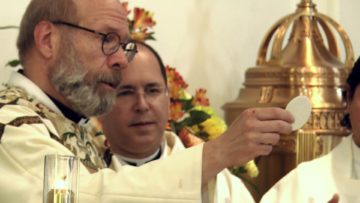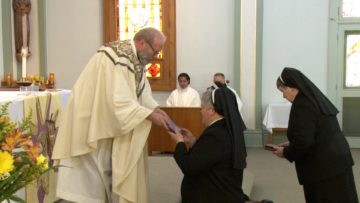The Gospel this coming Sunday is all about choice. We offer a Franciscan Gospel reflection and questions written by Fr. Paul Gallagher, OFM for your prayer. They are edited by Franciscan Sister of Christian Charity Sister Anne Marie Lom and Joe Thiel. The excerpts from the Sunday readings are prepared by Joe Thiel. To read or download the complete pdf with excerpts for your prayer, please click here: Franciscan Gospel Reflection July 21 2019. Excerpts are from the Lectionary for Mass for Use in the Dioceses of the United States of America, second typical edition © 2001, 1998, 1997, 1986, 1970 Confraternity of Christian Doctrine, Inc., Washington, DC. Used with permission. All rights reserved. No portion of this text may be reproduced by any means without permission in writing from the copyright owner.
Luke 10:38-42
As they continued their journey, Jesus entered a village were a woman whose name was Martha welcomed him. She had a sister named Mary who sat beside the Lord at his feet listening to him speak. Martha, burdened with much serving, came to him and said, “Lord, do you not care that my sister has left me by myself to do the serving? Tell her to help me.” The Lord said to her in reply, “Martha, Martha, you are anxious and worried about many things. There is need of only one thing. Mary has chosen the better part and it will not be taken from her.”
Background:
Last week’s gospel text ended with Jesus telling the familiar parable of the good Samaritan. Jesus told it in response to a scholar of the law who wanted to justify himself and wanted Jesus to define who should be considered one’s neighbor. Luke places this account of Martha and Mary offering hospitality to Jesus right after the parable of the good Samaritan.
Often Mary and Martha are understood as representing two types of service or models of discipleship. Martha is seen as representing the active ministry, and Mary as the contemplative ministry of prayer and study. While offering important reflections for many of us, that comparison seems to miss what would have been most apparent to the people of Luke’s community. In the text, Jesus is welcomed into the home and the company of two women without the protective presence of another male of authority. In Jesus’ day, it was not impossible for a woman to own property, but it was very unusual and would draw attention. Jesus ignores the norms of appropriate behavior and the expectation of maintaining separate and appropriate space and separate relationships for men and women. Traditionally men inhabited the public spaces in the community and within homes. Women were expected to stay separated, going to the well in the early morning, and remaining in the kitchen and the private places of the house.
In the gospel as Luke presents it, Jesus enters a house where Martha and Mary are present. It is possible that Luke is present, but Luke does not mention his presence. It is a detail that one might expect, given the possibility of scandal for the people of the day. Also, per the usual custom of the day, Lazarus would have been the one to greet Jesus and sit with him, while the two women attended to the other duties of hospitality. Instead, Luke describes Mary as sitting at the feet of Jesus listening to his teaching, in the customary positions of a teacher and a disciple. Martha is described as performing the traditional roles of hospitality for women of the day and the traditional response of female disciples. Think of Peter’s mother-in-law who, when healed, is reported by Luke to have “got up immediately and waited on them.” (Luke 4:39b)
It is impossible to know what is truly Martha’s motive by her comment to Jesus. But it is possible that part of her concern may have been fear of scandal that Mary’s action would bring upon them and their family. Jesus’ response was nontypical for the day, and therefore emphasizes his openness to both women and men disciples and the need for both aspects of hospitality, being present to the person and doing the work of caring for human needs.
Reflection Questions:
1. Can you recall a time when you were asking for help from God or others, and did not receive it?
2. The roles of men and women in our present culture and Church make me aware…
3. Mary as described in this gospel seems…
4. As I hear Martha’s concern in today’s gospel it sounds to me like…
5. Jesus’ response to Martha seems…
6. If I were one of the early Christians listening to Luke’s description of this incident for the first time, I think I would have responded…
7. Can you take some time now to talk with Jesus about how he responded to Martha, perhaps your own sense of needing help and how God has responded to you, or some other concern that arose within you from this gospel?




